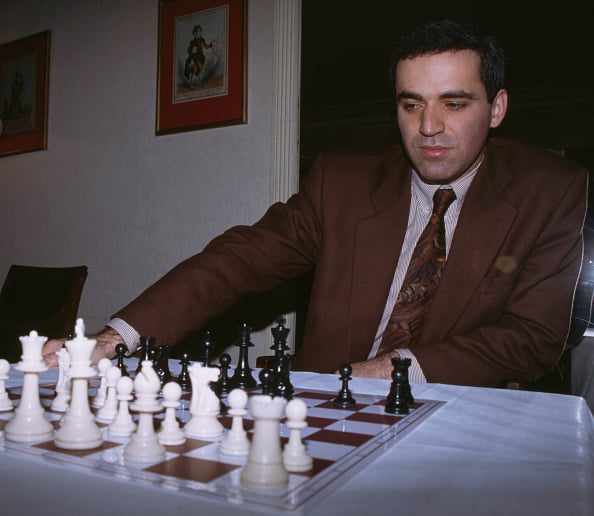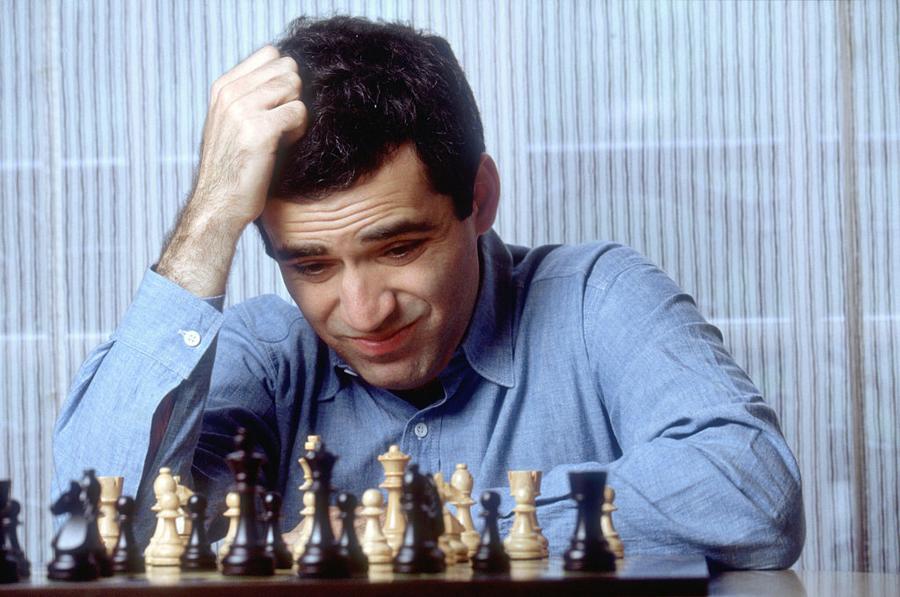What is Garry Kasparov's Net Worth?
Garry Kasparov is a Russian chess grandmaster, writer, and political activist who has a net worth of $6 million. Garry Kasparov was ranked number one in the world for a record 255 months between 1984 and his retirement in 2005. Among the highlights of his career, he became the youngest ever undisputed World Chess Champion in 1985, and in 1997 faced off against IBM supercomputer Deep Blue in a heavily publicized match that he lost. He played a total of eight Chess Olympiads including Valletta 1980, Lucerne 1982, Dubai 1986, Thessaloniki 1988, Manila 1992, Moscow 1994, Yerevan 1996, and Bled 2002. Kasparov has taken on a number of political activities since retiring, including forming the United Civil Front in Russia and the Renew Democracy Initiative in the United States. He established a coalition called United Civil Front which opposes the political policies of Vladimir Putin. He is also a board member of the Human Rights Foundation. Over two dozen books have been written about Kasparov's chess and political endeavors.
Early Life
Garry Kasparov was born on April 13, 1963 in Baku, Azerbaijan in the Soviet Union. His mother, Klara, was Armenian, while his father, Kim, was Jewish. When Kasparov was seven, his father passed away. He also began attending the Young Pioneer Palace. At the age of ten, Kasparov commenced training at the chess school of Mikhail Botvinnik.
Career Beginnings
Kasparov established himself as a formidable player in the chess world with his two consecutive wins at the Soviet Junior Championship in 1976 and 1977. Following those victories, he played in the Sokolsky Memorial tournament, where he claimed first place and officially became a chess master. Moreover, Kasparov qualified for the first time for the Soviet Chess Championship. He quickly ascended the FIDE world rankings, helped along by his major win in a grandmaster tournament in Bosnia and Herzegovina in 1979. The year after that, Kasparov won the World Junior Chess Championship and became a grandmaster.
Rising to World Number One
Having become a grandmaster in the early 80s, Kasparov went on to rise in the ranks of the world's greatest chess players throughout the decade. Thanks to his wins in the USSR Chess Championship and the Moscow Interzonal tournament, he achieved the ranking of number two in the world by 1982. By the start of 1984, Kasparov was ranked number one in the world with a FIDE rating of 2710, at the time making him the youngest-ever player to be ranked in the top position.
World Champion
In late 1984, Kasparov faced off against Anatoly Karpov in the World Chess Championship. The match was long and contentious, taking many ups and downs across a record 48 games before it was controversially terminated without result by FIDE president Florencio Campomanes. A new match was subsequently created in 1985 in which the first player to win 12 ½ points would claim the Championship. Ultimately, Kasparov clinched the title by a score of 13-11; at the age of 22, he became the youngest-ever World Chess Champion. He successfully defended his title in 1986, and again in 1987. Kasparov played a fifth match against Karpov in 1990, and won once again.

Getty Images
Break from FIDE
Engaged in a long feud with the organizing body FIDE, Kasparov started breaking away from the organization in the mid-to-late 80s. In opposition, he formed the Grandmasters Association and later the Professional Chess Association. Upon the news that Kasparov would be defending his World Champion title against Nigel Short in a match outside of FIDE's jurisdiction, both men were ejected from FIDE in 1993. Kasparov continued to play under his PCA organization, defending his title in 1995 against Viswanathan Anand.
Playing Against Computers
Kasparov has been closely linked with computers since the 80s. In 1983, he was awarded a BBC Micro computer by Acorn Computers, which sponsored his Candidates semifinal match against Viktor Korchnoi. Two years later, Kasparov began discussing with computer chess magazine editor Frederic Friedel how chess database programs could be useful tools for preparation. Friedel went on to found the software company ChessBase, and gave a copy of a database program to Kasparov.
In 1985, Kasparov played against 32 chess computers in Hamburg, Germany, winning every game. Four years after that, he beat the chess computer Deep Thought in a two-game match. Kasparov's most famous matches against a computer were his matches with the IBM supercomputer Deep Blue. He won the first match in 1996, but lost the second in 1997. Kasparov's loss was the first ever for a reigning World Chess Champion against a computer under tournament conditions. Later, in 2003, he was defeated by the program Deep Junior and drew a tie against X3D Fritz.
Later Playing Years and Retirement
In 2000, Kasparov faced off against his former student Vladimir Kramnik in the World Chess Championship. Making a critical error in Game 10, Kasparov ultimately lost to his opponent, thus relinquishing his World Champion title. However, he remained the top-rated player in the world thanks to his victories in a number of major tournaments. After winning his ninth Linares tournament, Kasparov announced his retirement from competitive chess in early 2005. He continued playing in rapid chess events over the subsequent years, and also coached such famous players as Magnus Carlsen, Viswanathan Anand, and Hikaru Nakamura.

Chess Master Garry Kasparov, May 1990. (Photo by julio donoso/Corbis via Getty Images)
Political Activities
Beyond the world of chess, Kasparov has been involved in numerous political endeavors. In 1984, he joined the Communist Party of the Soviet Union, and a few years later was elected to the Central Committee of Komsomol. He left the Party in 1990. That year, Kasparov helped in the creation of the Democratic Party of Russia. Following his retirement from chess in 2005, he founded the United Civil Front, a Russian social movement intended to preserve electoral democracy in the country. Kasparov was also integral in establishing the Other Russia, a coalition in opposition to Vladimir Putin's government. In that same vein, he helped organize a number of pro-democracy demonstrations in Russia. Due to Putin's growing authoritarian rule, Kasparov left Russia in 2013. He went on to found the nonprofit Renew Democracy Initiative in the United States and to become chairman of the Human Rights Foundation.
Personal Life
With his first wife Masha, Kasparov had a daughter. The marriage ended in divorce. Kasparov subsequently wed Yulia, with whom he had a son before the couple's divorce in 2005. With his third wife, Dasha, Kasparov has a daughter and a son.
Real Estate
In December 2009 Garry paid $3.4 million for a Robert A. Stern-designed condo at a building called the Harrison located in Manhattan. The three-bedroom, 1,800 square foot apartment was purchased with a $1.25 million mortgage after negotiating a $350,000 discount to the asking price.
He previously owned a 900 square foot apartment at a building called Lombardy, which he bought in 2005 for $320,000 and sold in October 2009 for $630,000.
/2023/01/Garry-Kasparov.jpg)
/2016/01/magnus-e1734109380776.jpg)
/2012/07/Viswanathan-Anand.jpg)
/2022/05/bobby-fischer.png)
/2023/03/Alexei-Navalny.jpg)
/2014/10/Anatoly-Karpov.jpg)
/2020/07/mlp.jpg)
/2010/01/Deryck-Whibley.jpg)
/2020/07/jl.jpg)
/2010/01/GettyImages-183679600.jpg)
/2022/10/Anne-Murray.jpg)
/2014/09/Kim-Delaney.jpg)
/2009/11/Tim-Duncan.jpg)
/2023/01/lance-armstrong.jpg)
/2021/04/Sara-Gilbert.jpg)
/2025/03/Kelli-Ferrell.jpg)
/2010/05/Jaleel-White.jpg)
/2023/01/Garry-Kasparov.jpg)
/2014/10/Anatoly-Karpov.jpg)
/2012/07/Viswanathan-Anand.jpg)
/2022/05/bobby-fischer.png)
/2021/06/GettyImages-626298282.jpg)
/2014/08/GettyImages-163615763.jpg)
/2023/03/Alexei-Navalny.jpg)